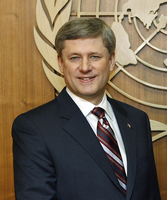TORONTO -- Wrapping up a trip to China last week, Canadian Prime Minister Stephen Harper described the visit as “very successful.” The trip saw the signing of a number of trade deals worth an estimated $3 billion in oil, natural gas, minerals and other products. But though it also ended with the commissioning of a feasibility study into the possibility of a free trade agreement between the two countries, Harper was quick to advise caution on what remains a long-term goal.
That the two economies need each other is not in question. With bilateral trade valued at $50 billion in 2011, China is Canada’s second-biggest trade partner, after the U.S., and the country’s third-largest export market, after the U.S. and Mexico.
China, which recorded economic growth of 9.2 percent last year, is the world’s largest consumer of resources and has been buying into overseas oilfields to secure fuel for its expanding economy. Recent reports show that China has invested about $16 billion in Canada's energy sector in the past two years, including a deal in which PetroChina, the country’s largest oil company, bought a 60 percent stake in a project run by Athabasca Oil Sands Corp. for $1.9 billion.

